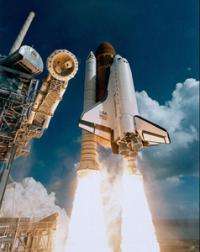Q&A: Saying goodbye to the space shuttle

With the final launch of the Atlantis, NASA retires its space shuttle program. We spoke to Professor Chris Damaren of the University of Toronto Institute for Aerospace Studies about the end of an era in manned space travel.
Damaren researches spacecraft dynamics and control systems. He also serves as Vice-Dean, Graduate Studies in the Faculty of Applied Science and Engineering.
What does the end of the space shuttle program mean for Canada and the United States?
We lose regular access to low earth orbit and to the International Space Station. There are other ways to get there, though—the Russian Soyuz Vehicle for example. But that’s not something that the we can depend on on a regular basis.
What will be the successor to the shuttle program?
Prior to this year there was something called the Constellation Program, which was a road map that would see the United States back on the moon by 2020 and ultimately sow the seeds for a manned visit to Mars. The Obama administration put the brakes on the program and has replaced that with a focus on more input from the private sector.
So there’s no official program waiting the wings.
No, that’s the problem. We’re kind of in limbo at the moment. But that said, there are a lot of things going on in space exploration. There are still plans to visit Mars on a regular basis with robotic vehicles. None of that’s changed.
The shuttle is optimized for one thing, and that’s manned space flight. That’s the bit that’s in limbo.
What about the International Space Station?
There is still an implied commitment from NASA to run the space station until at least 2020, probably beyond that. The feeling is now it will be thought of as a national lab, like a terrestrial-based lab but it will be in space.
Can you say anything about the future of manned space travel by North Americans?
There’s not a well-defined answer at this point. There are a number of things that people have talked about. Obama has mentioned the possibility of landing on an asteroid. That would involve a flight of longer duration than we’re used to, certainly much longer than getting to the moon. But who is going to develop the vehicles? These are the kinds of details that are lacking.
Why would we want to land on asteroid?
They’re seen as a source of raw materials. They’re very rich in certain kinds of minerals.
So it seems like we’ve reached the end of the era of exploring space just for its own sake, out of a fundamental curiosity.
That’s a good point. I think on a fundamental level that still drives us. Why do we engage in space exploration? The same reason Jacques Cartier and Henry Hudson and people like that hit the ocean and decided to head in the direction of North America. I think that still exists.
What would private sector-driven manned spaceflight be like? The layperson’s stereotype is that rich people will be able to buy tickets to space.
That’s how it is initially going to manifest itself. The first forays of private companies will be things like Richard Branson bankrolling visits to space for people with money. But I don’t think that’s what Obama is referring to when he says that rather than NASA developing the Constellation Program, we expect the private sector to step in. I think he’s expecting them to do the kinds of things that NASA is currently doing.
Because presumably there’s a return to be made.
Exactly.
What role does Canada play in the future of public or private sector space program?
Our main interaction on the manned front has been participation via our astronaut program. I’m not sure where that fits. I could see us continuing to visit the space station, obviously by different mechanisms than the shuttle. We have taken on new astronauts fairly recently and I would see them taking part.
So maybe this isn’t as big a deal as it seems?
In the short duration it is, but in the long term, it’s not as bad as people are making out. It’s just that we have to wait for different mechanisms to manifest themselves.
Provided by University of Toronto




















